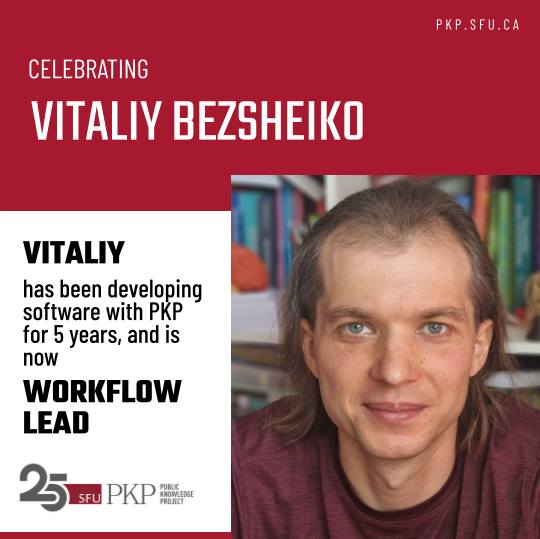About 5 years ago, PKP welcomed Vitaliy Bezsheiko to the team as a Software Developer working mostly on the editorial and JATS XML workflow as well as on themes development. Now, in his new role as Software Developer Workflow Lead, Vitaliy takes the time to reflect on his past role, experiences, milestones, the meaning of his work, and what the future may hold.
Vitaliy, by way of introduction, can you share a bit about yourself?
I’m situated in Kyiv, Ukraine, where last year we withstood Russian attempts to seize the city and now trying to repel their attack on other parts of the country.
Before joining PKP, I held a position of an assistant professor at a medical university, where, among other things, helped to start and manage the university’s peer reviewed medical journal. I was involved in a review of software solutions to manage and present our journal online, and Open Journal Systems (OJS) was chosen as the most suitable for our needs. That was the time of a new major OJS 3.0 release, and my first encounter with the platform.
It’s impossible to imagine what that must have been like for you, and the impacts the Russian attempts on the city and country have had on you. PKP wants to take this moment to thank you for your continued dedication to opening access to scholarly publishing for the global public good.
What was it that first attracted you to software development at PKP?
Using coding mostly for data analysis, it all changed when I tried to install and wire together components of Ambra, another open source platform which also was considered for our university’s journal (special thanks to Eric Lopatin, former engineer at PLOS for help), and I continued by way of developing the Old Gregg theme for OJS 3 to customize the look of the journal, which I still maintain and keep available for the community.
I don’t think that OJS documentation was available at that time, but I received a lot of insights through the PKP Community Forum along with help from the community and developers when building plugins. Our journal uses a JATS XML centric publishing model and I was surprised with the level of integration I was able to achieve, making the conversion process of article text between different formats much easier.
PKP is driven by both philosophical and pragmatic questions. What does developing free and open source software (FOSS) to increase the quality and reach of scholarly publishing mean to you?
Having an academic background, I always stood for free dissemination of research findings, as presenting a paper behind a paywall significantly narrows its availability for the research community, limiting its usefulness. The current situation around scholarly publishing reminds me of the scene from Monty Python’s Meaning of Life when the hospital leases the machine that goes “ping” (2:34) back from the company they sold it to – when universities are buying back access to papers that were published with their own publicly funded research.
In my ideal world, universities and research institutions have enough resources and capabilities to present research data to everyone without intermediators and/or at least under open access. Developing a free and open source software (FOSS) for publishing brings this dream closer to reality.
What are some of your milestones from the past 5 years?
I’m proud to be taking a part in the development of official themes for OJS – Health Sciences, Classic, Immersion and Pragma. These brought customization options for those who wanted to present the journal beyond capabilities of the default theme.
Another part of my interests has been JATS XML workflow, where I investigated the effectiveness of machine learning tools for data conversion from common publication formats to the Journal Article Tag Suite, a special type of XML, defining structural elements of a document. This format is aimed at facilitating interchange of journal articles between publishers and archives and often used in article production and publishing
One of such tools is Grobid; it’s capable of parsing raw documents, like scientific papers in PDF format, and recognizing then extracting an article’s structured elements. It’s probably the best supervised ML approach using sequence labelling to generate tagged article’s data, but the output still requires manual correction, and the approach overall requires a high level of expertise. Finally, I’ve contributed to the forthcoming 3.4 release of OJS, OMP and OPS, where the community would be able to evaluate a new email management system built on top of the Laravel and Symfony Mailer.
You’ve recently taken on the position of Software Developer, Workflow Lead. Congratulations! What do you hope to accomplish or bring to your role?
I hope to expand my previous accomplishments and am planning to advocate for the adoption of a document centric workflow, the main part of which is full-text collaborative editing. Article parsing, conversion between different formats (including to/from JATS XML), and the final presentation as well as publishing are other key points of this process, which constitutes a solid background.
What would you say to any aspiring people hoping to be in your field?
The development of FOSS for scholarly publishing gathers people with different professional backgrounds, as it requires a wide range of expertise, not only related to modern programming or knowledge of publishing process in general, but also requires understanding the needs of other academic communications participants from the perspective of authors, researchers, readers, and librarians. There are a lot of areas in this field to pick from for your own professional growth.
Do you have any additional messages you would like to share?
I would like to thank Nate Wright for his contribution to PKP and help in shaping me to fit this new role.
Thank you Vitaliy, for taking the time to do this interview and for sharing your reflections with the community. Congratulations again and best to you now and in the future.
____

